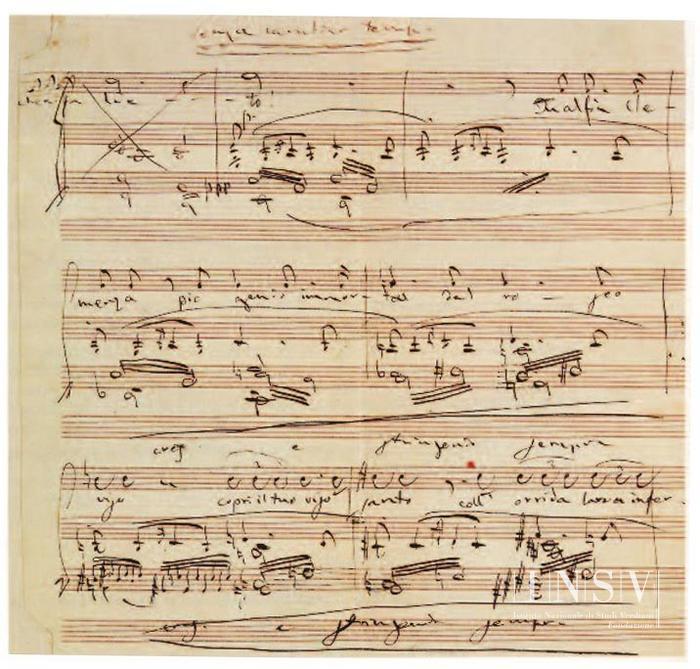Corrispondenza
Giuseppe Verdi a Giulio Ricordi, 31/12/1886
Data
- Data
- [Genova], 31 dicembre 1886
Luogo di destinazione
- Luogo di destinazione
- [Milano]
Tipologia
- Lettera
Descrizione fisica
- Un bifolio (cm. 21×13,5), una pagina scritta, con busta. Allegato: un foglio oblungo con tre sistemi pentagrammati, otto battute (cm. 17,2×25), autografo, al quale è attaccato con ceralacca un altro foglietto (cm. 7×7), sul quale è appuntata l'ottava battuta.
Ubicazione presso il soggetto conservatore
- Ubicazione
- Coll. privata
Trascrizione
Ultimo del ’86!
[...]
Nello squarcio che rifeci del solo d’Otello terzo Atto avete lasciato un cambiamento di tempo che non va bene. Anzi quella frase dei Violini et. andrebbe piuttosto allargata di più... ma il meglio è lasciare un tempo solo e fare i cres: e strin: come io ho indicato.
[...]
Note
- Il testo è noto solo in parte per quanto è trascritto nel catalogo dell'asta Friedrich Georg Zeileis, Katalog einer Musik-Sammlung, Gallspach,1992, p. 170, ove il resto del testo è sunteggiato in tedesco:
Ich habe den vollständigen Entwurf erhalten, ich hatte keine Zeit, ihn durchzustudieren, aber mir ist sofort ein schwerwiegender Fehler sehr aufgefallen an der Stelle des solos von Otello im 3. Akt. Da habt ihr eine Tempoänderung gemacht, die nicht gut ist, vielmehr wäre diese Phrase der Violinen besser verlängert, aber das Beste ist, ein Tempo auszulassen und crescendo und stringendo zu machen, wie ich es angegeben habe. Daher hebt die beiden auf. Ich lege das erste Original [das dazugehörige kleinere Notenblatt] bei, um mich besser verständlich zu machen.
[tre batt. pentagrammate: sol3, sib3 acc., lab3 in seminin.; do4 min. puntata,
sib3 semimin.; mib4 min. puntata].
Wie ich euch gestern schrieb, schickt mir Arbeit. Ich werde euch schreiben, wann ich komm.
Con questa annotazione:
An das Notenzitat schließt das dazugehörige Notenblatt an, das aus einem Ausschnitt aus einem größeren Blatt und einem mit Siegellack daran geklebten kleinen (von Verdi mit Bleistift linierten) Blättchen besteht, auf denen die 8 Takte von Verdi mit seinen ganz exakten Anweisungen nochmals geschrieben sind. Die Überschrift lautet: «senza cambiar tempo». Diese bisher völlig unbekannt gebliebenen Korrekturen zu Otello, die einen tiefen Einblick in die Entstehung dieses beispiellosen Meisterwerkes gewähren und zeigen, daß nur fünf Wochen vor der Uraufführung am 5. Februar 1887 an der Mailänder Scala der Schaffensprozeß noch keineswegs abgeschlossen war, stammen aus dem persönlichen Nachlaß Giulio Ricordis in Mailand. Die beiden Notenblätter konnte ich im Februar 1971 erwerben, den zum kleineren Notenblatt gehörenden Brief samt Couvert, dessen Connex vom Verkäufer gar nicht erkannt worden war, im März 1973.
La lettera è poi stata battuta all'asta da J & J Lubrano Annual Meeting of the American Musicological Society, 29 ottobre - 1 novembre 1998, lotto 202, riportata a p. 12 del catalogo ove si legge:
Autograph musical manuscript, signed and dated “Last day of ’86” with pasted additions. In the accompanying one-page letter Verdi states that, in looking over the proofs, he immediately noticed a serious error in Otello’s solo in the third act. He encloses the corrected version in the form of an 8-measure manuscript in piano-vocal score, 17.2×25 cms., with an expanded ending pasted onto the manuscript. Within the text of the letter Verdi notates the original idea. In addition, the composer states that Ricordi has made a change in tempo which he does not approve. Verdi directs that the tempo change be left out, but asks that the dynamics he has indicated on the manuscript be added.
E poi di nuovo presso Sotheby’s, Londra, 17 maggio 2002, lotto n. 187, ove alla p. 150 del catalogo i fogli sono descritti separatamente:
2) Autograph working manuscript of part of Otello, Act 3, from Otello’s solo «Dio! mi potevi scagliar», a correction leaf for the printed vocal score, unsigned, «che mi fa lie[to] Tu alfin Clemenza...» [cf Ricordi, page 230], notated in brown ink on three systems, each of three staves, with additional passage on a separate slip of paper attached with a wax seal, comprising a passage of eight bars in all, the first bar deleted, inscribed by the composer “senza cambiar tempo”, with three notes added in the margin at the beginning, 1 page, c. 17×25 cms.), 12- and 3-stave paper, cut from 2 larger leaves of disimilar paper, no place or date, [possibily St Agata, 2 December 1886]
3) Autograph letter to Giulio Ricordi signed (“G. Verdi”), informing him that he has just received the proof of the complete Otello vocal score, and, while he has not had time to examine it in detail, he has immediately seen a rather serious mistake in Otello’s solo in Act 3 («Dio! mi potevi scagliar tutti i mali»). Verdi explains that in the passage he had altered, a tempo change has been left standing which is no longer suitable, he requests a constant tempo marked crescendo and stringendo. He clarifies his request with a one-bar musical quotation from the end of Otello’s verse «... che mi fa lieto», and reminds him to send the work to Du Locle, and that he will write and tell him when he is coming, 1 page, 8vo, autograph envelope, Genoa, 31 December 1886. [segue stralcio “Nello squarcio [...] ho indicato”].
Il foglio più grande è probabilmente quello inviato già a Ricordi il 2 dicembre, poi resogli insieme alle bozze; qui Verdi aggiunge l'indicazione «senza cambiar tempo». Il brano corrisponde alle battute di p. 230 dello spartito 1887.
Posseduto Insv
Immagine del foglio pentagrammato tratta dal catalogo Sotheby's (v. sotto).
Bibliografia
Sotheby's, Music. Including the autograph manuscript of Mendelssohns "Fingals cave" . London, Friday 17 May 2002, Londra, 2002, p. 12.
Carteggio Verdi-Ricordi 1886-1888, a cura di G. Carrara Verdi, F. Cella, M. Conati, G. De Van, P. Petrobelli, Parma, Istituto nazionale di studi verdiani, 2010, pp. 162-164.
Media

Giuseppe Verdi a Giulio Ricordi, 31/12/1886
1 / 1